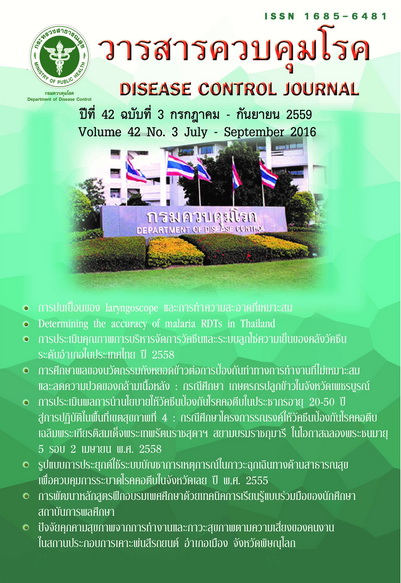The development of sex education training course through cooperative learning technique of undergraduate students at Institute of Physical Education
DOI:
https://doi.org/10.14456/dcj.2016.17Keywords:
cooperative learning, training course, sex education, undergraduate students at Institute of Physical EducationAbstract
The purposes of research and development were (1) to study the state of problem and the needs for the development of sex education training course for the undergraduate students at Institute of Physical Education. The samples were 17 lecturers who had taught Sex Education course, 17 administrators, and 392 undergraduate students. The research instruments were composed of semi-structured interview and survey of needs. For data analysis, Mean, standard deviation, and content analysis were used; (2) to create curriculum of training course for sex education through cooperative learning technique of undergraduate students at Institute of Physical Education. The samples were 6 experts and 30 undergraduate students. The research tools comprised the curriculum and the manual of training course, skills assessment form, sex education test, attitudes evaluation form towards sex education, satisfaction evaluation form with training course curriculum, and curriculum appropriateness evaluation form. For data analysis, Mean comparing with the criterion of average, Item content validity: I-CVI, S-CVI, Difficulty, discrimination, and reliability were utilized; (3) to try out and evaluate the results of training course curriculum on sex education through cooperative learning technique of undergraduate students at Institute of Physical Education in the pilot experimental group and the actual situation group. The research instruments were made up of the curriculum and the manual of training course, skills assessment form, sex education test, attitudes evaluation form towards sex education, satisfaction evaluation form with training course curriculum. For data analysis, percentage, Mean, standard deviation, dependent sample t-test, one-sample t-test, and Effectiveness Index: E.I. were used. The findings were found that the state of instructional management for sex education course taught in Institute of Physical Education, most lecturers taught this course according to the course syllabus and they focused on teaching by the lecture. The found problems were that undergraduate students paid less attention to the lecture; the place for studying was not favorable; it lacked media and technology and there were other activities, resulting in a decline of time for the instruction. As for the content, it was found that undergraduate students, lecturers, and administrators needed the aspect of similar content. Cooperative learning technique was used in the constructed curriculum which included 9 elements as follows; (1) Principle of curriculum, (2) Objective of curriculum, (3) Time period of training course, (4) Qualification and number of the trainees, (5) Training course media, (6) Results evaluation of training course, (7) Structure of curriculum, (8) Schedule of training course, and (9) Guidelines for organizing the training course activities. When the curriculum was tried out for the pilot experiment and the actual situation experiment, it was found that there was significantly an increase in both groups’ knowledge of sex education, in their attitudes towards sex education and in their skills needed to learn about sex education at the .05 level. In addition, their satisfaction with the training course curriculum was significantly higher than that of the set criteria, and there was Effectiveness Index value of knowledge in each group at 0.2887 and 0.3692 respectively.
Downloads
References
2. เพชรศรี ศิรินิรันดร์, พัชรา เบญจรัตนาภรณ์, อรทัย หรูเจริญพาณิชย์, พรทิพย์ เข็มเงิน. รายงานความก้าวหน้าระดับประเทศตามปฎิญญาว่าด้วยพันธกรณี เรื่อง เอชไอวี/เอดส์ ประเทศไทย มกราคม 2551- ธันวาคม 2552. กรุงเทพมหานคร: เฟื่องฟ้าพริ้นติ้ง; 2553.
3. สินีนาถ แย้มลออ, ศิริวรรณ วชิรวงศ์. พฤติกรรมเสี่ยงทางเพศสัมพันธ์กับความรู้เรื่องการติดเชื้อเอชไอวี ในกลุ่มนักเรียนชั้นมัธยมศึกษาปีที่ 2 จังหวัดสุพรรณบุรี พ.ศ. 2548-2550. วารสารโรค
เอดส์ 2551;21:28-35.
4. สมพงษ์ พัฒนกิจไพโรจน์. การศึกษาปัจจัยเพื่อป้องกันพฤติกรรมเสี่ยงต่อการมีเพศสัมพันธ์ของวัยรุ่น. วารสารสำนักงานป้องกันควบคุมโรคที่ 1 2551; 12:101-3.
5. สุจนา คีรีวัลย์. ความรู้และการปฏิบัติตนเกี่ยวกับเพศศึกษาของนักศึกษาระดับอุดมศึกษาในจังหวัดอุตรดิตถ์ [วิทยานิพนธ์ปริญญาศิลปศาสตรมหาบัณฑิต]. อุตรดิตถ์: มหาวิทยาลัยราชภัฏอุตรดิตถ์; 2550.
6. สำนักงานกองทุนสนับสนุนการสร้างเสริมสุขภาพ. เรียนรู้รักอย่างมีทางเลือก. จดหมายข่าวชุมชนคนรักสุขภาพ ฉบับสร้างสุข 2554;7:4-5.
7. FHI 360. An overview of curricula and other educational materials on youth sexual and repro¬ductive health [Internet]. [cited 2016 Apr 18]. 23 p. Available from: https://www.iywg.org> sites>iywg>files.
8. นิภาพรรณ วงศ์หนองแวว, ผาสุก เปานาเรียง, บุษญา แสงแก้ว. รายงานการวิจัยความสัมพันธ์ของระดับชั้นปีกับพฤติกรรมทางเพศต่อคู่รักที่ไม่เสี่ยงของนักศึกษาชาย สถาบันการพลศึกษา วิทยาเขตภาคตะวันออกเฉียงเหนือ. มหาสารคาม: สถาบันการพลศึกษา วิทยาเขตมหาสารคาม; 2553.
9. สุชิน บัวงาม. เจตคติของนักศึกษาสถาบันการพลศึกษาที่มีต่อความรู้เรื่องเพศ. ชลบุรี: สถาบันการพลศึกษา วิทยาเขตชลบุรี; 2550.
10. Johnson D.W, Johnson R.T, Holubec E.I. The nuts and bolts of cooperative learning. Minneso¬ta: Interaction Book Company; 1994.
11. กนกพร ทองสอดแสง. การพัฒนารูปแบบการฝึกอบรมครูสอนวิชาเพศศึกษาด้วยเทคนิคการเรียนรู้แบบร่วมมือ [วิทยานิพนธ์ปริญญาครุศาสตร์อุตสาหกรรม ดุษฎีบัณฑิต]. กรุงเทพมหานคร: มหาวิทยาลัยเทคโนโลยีพระจอมเกล้าพระนครเหนือ; 2553.
Downloads
Published
How to Cite
Issue
Section
License
Articles published in the Disease Control Journal are considered as academic work, research or analysis of the personal opinion of the authors, not the opinion of the Thailand Department of Disease Control or editorial team. The authors must be responsible for their articles.






